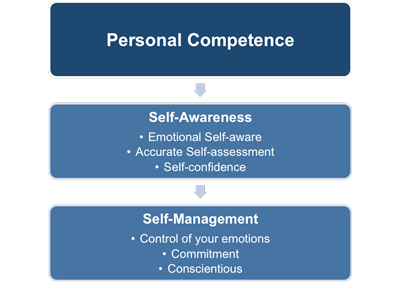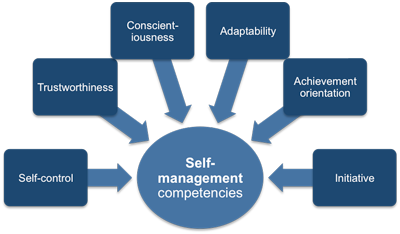Emotional Intelligence and Personal Competence
The development of your emotional intelligence can be divided into personal and social competencies.
Personal Competence - self-awareness and self-management
Social Competence - social awareness and relationship management
Before you can begin to plan ways to improve your EQ competencies you need to identify your current level within each competency and then decide the best way you can achieve a 'high' level in each.
As with all areas of management you will need to adapt or add to the 'high level' descriptions used in this eBook to take into account the unique attributes of your role and organization.
 |
Your level of personal competence is one half of how to develop your emotional intelligence (EQ). It consists of two key attributes:
Self-Awareness
This is your ability to recognize your own emotions and their effects on your self and other people. It represents the foundation of EQ because without being aware of and understanding your own emotions it is impossible to move into the other EQ competencies like self-management and social awareness.
Self-Management
Builds on your self-awareness, using your own self-control to ensure your emotions don't control you regardless of the situation. It involves using what you know about your emotions to both manage these emotions and motivate yourself.
Self-awareness means that you understand how you feel and can accurately assess your own emotional state. To do this you need the following competencies:
• Emotional self-awareness
• Accurate self-assessment
• Self-confidence
 |
In order for a person to become emotionally self-aware they may need to accept that they have an inbuilt reluctance to admit to certain negative feelings. This can be overcome by being aware of the behaviors that result from these negative emotions, rather than necessarily having to admit to the underlying negative emotions.
You can recognize an individual who has a high level of emotional self-awareness because they will:
• Know which emotions they are feeling and why
• Realize the links between their feelings and what they think, do, and say
• Recognize how their feelings affect their performance
• Have a guiding awareness of their values and goals
• Adopt behaviors that minimize the effects of their own emotions on a situation.
Once you are able to identify your own emotions and how they can impact situations you are able to accurately assess yourself. This enables you to understand and explore your own strengths and weaknesses, as well as being willing to explore them with others.
Daniel Goleman describes accurate self-assessment in terms of people who are:
• Aware of their strengths and weaknesses
• Reflective and capable of learning from experience
• Open to candid feedback and new perspectives
• Interested in continuous learning and self-development
• Able to show a sense of humor and perspective about themselves.
Self-assessment involves honestly investigating and acknowledging your emotional strengths and weaknesses. Reflecting on your experiences and defining key actions required to address any shortfall could help you achieve this.
Developing a strong capability for self-assessment will help you to learn from new experiences because it will highlight those areas that offer opportunities for self-improvement and development.
The final competency of self-awareness is that of self-confidence. This is your ability to ground yourself so that you are secure and self-assured in whatever situation you may find yourself. Daniel Goleman describes self-confidence as:
'A strong sense of one's self-worth and capabilities.'
You will recognize individuals with a high level of self-confidence because their behavior and communications show that they have a:
• Certainty about their own value and capabilities
• Strong presence
• High level of self-assurance
• Willingness to express an unpopular opinion or stand up for something that is right if it is what they truly believe
• Ability to make quick decisions even in uncertain and pressurized circumstances
• Belief that they can control the direction of their lives - and they do.
People who are self-confident understand that they have a great deal of control over what happens in their lives. This means that the more self-confident you can become, the more you will find that you are able to influence your future.
Once you are aware of how your emotions affect your behavior and attitude towards situations you will be able to self-manage. To achieve this you use your self-control to manage your emotions whatever your circumstances and motivate yourself to succeed.
By understanding and being able to control your emotions you are able to manage them in such a way as to generate positive interactions with those you come into contact with. The competency of self-management has six different skill attributes:
Self-control - the ability to remain composed whatever state your emotions are in. People with this competence:
o Manage their impulsive feelings and distressing emotions well
o Stay composed, positive, and unflappable even in trying moments
o Think clearly and stay focused under pressure
 |
Trustworthiness - means that you will do what you say, when you say you'll do it. People with this competence:
o Act ethically and are above reproach
o Build trust through their reliability and authenticity
o Admit their own mistakes and confront unethical actions in others
o Take tough, principled stands even if they are unpopular
Conscientiousness - involves an individual being thorough, careful or vigilant and implies a desire to perform a task well. People with this competence:
o Meet commitments and keep promises
o Hold themselves accountable for meeting their objectives
o Are organized and careful in their work
Adaptability - the ability to change something, or oneself, to fit occurring changes. People with this competence:
o Smoothly handle multiple demands, shifting priorities, and rapid change
o Adapt their responses and tactics to fit fluid circumstances
o Are flexible in how they see events
Achievement orientation - requires an individual to show concern for working toward a self-imposed and defined standard of excellence. People with this competence:
o Set themselves challenging goals
o Measure their own performance against those goals
o Actively seek out information to get the job done
o Use their time efficiently
Initiative - means taking the lead in problem-solving and conflict resolution as well as taking action to prevent problems from occurring in the first place. People with this competence:
o Seek out fresh ideas from a wide variety of sources
o Entertain original solutions to problems
o Generate new ideas
o Take fresh perspectives and risks in their thinking
Self-management is critical for a manager because no one wants to work for someone who is not in control of themselves and whose reactions depend on their prevailing mood.
You may also be interested in:
Understanding Emotional Intelligence | Goleman's Model of EI | Emotional Quotient (EQ) and IQ | EQ and Management | EQ Timeline | Can EQ be Developed? | Social Competence | EQ Framework.



